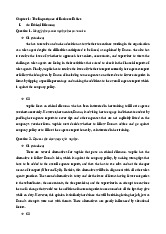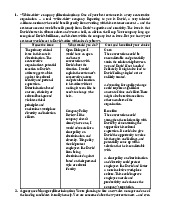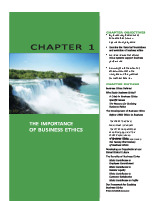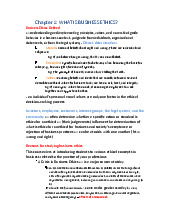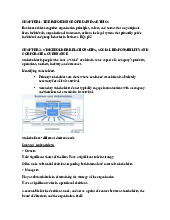


















Preview text:
lOMoAR cPSD| 58511332 05/09/2021 CHAPTER 3:
MORAL PHILOSOPHIES AND VALUES PHAM THI BICH NGOC 1
BUSINESS ETHICS: FUNCTION, DOMAINS, AND DISCIPLINES 2 2 Đạo đức siêu hình lOMoAR cPSD| 58511332 05/09/2021 META-ETHICS
❖The study of moral thought and moral language
➢Objectivist vs. Subjectivist: Do morals represent "truths" to be
uncovered, or are they entirely subjective?
➢Egoistic or Universalistic: consideration only of the person who is doing
the deciding (e.g., one's own happiness) OR a more encompassing
perspective (e.g., the well-being of all involved) 3 3 METAETHICAL QUESTIONS
❖ 1. Are ethical principles entirely subjective expressions of personal values and attitudes
or do they represent objective truths to be discovered?
❖ 2. If they are only subjective does that mean that each person's ethical standards (and
by extension, each society's) must be considered "right" for them, even if they seem patently immoral?
❖ 3. If they are "objective" what is the nature of those truths, and how might we ascertain them?
❖ 4- What about religion? Is secular morality compatible with religious precepts, or
perhaps even dependent on them? Isn't religious belief the source of all morality? 4 4 lOMoAR cPSD| 58511332 05/09/2021 METAETHICAL QUESTIONS
❖ 5. What about conclusions drawn from the biological, behavioral and social sciences
that study human behavior? Shouldn't the nature of humankind tell us something about ethical behavior?
❖ 6. What is meant by the ethical constructs "right" and "wrong," "good" and "bad,"
"justice" and "injustice"? How are they to be defined?
❖ 7. In deciding whether an action is right or wrong whose interests should be
considered: only those of the "actor", the subgroup(s) in which the actor is a member,
or all those directly affected by the action? Aren't we all governed primarily by self-
interest? ❖ 8. What about the distinction between knowing the right thing to do and doing it?
Why should one do the correct thing? 5 5
EXAMPLES OF META-ETHICAL THEORIES
❖ Divine command theory: What is "good" (i.e., moral, just, or right) is equivalent to "God's will.”
➢ Are right actions right because God commands them? lOMoAR cPSD| 58511332 05/09/2021
➢ Are right actions commanded by God because they are right?
❖ Natural Law theory: (Thomas Aquinas)
➢ Right acts are those in accordance with Natural law (acting to promote basic good (life,
reproduction, educate one’s offspring…) 6 RELATIVIST PERSPECTIVE
❖ Individuals and groups derive definitions of ethical behavior subjectively from experience. ➢
Descriptive relativism: Relates to observations of other cultures ➢
Metaethical relativism: Proposes people see situations from their own perspectives
✓ No objective way of resolving ethical disputes between different value systems and individuals ➢
Normative relativism: Assumes one person’s opinion is as good as another’s ❖ The relativist
observes the actions of members of an involved group and attempts to determine that group’s
consensus on a given behavior. A positive consensus signifies that the group considers the action to be ethical.
❖ A problem with relativism is that it emphasizes peoples’ differences while ignoring their basic
similarities. Research indicates that relativism is negatively related to a person’s sensitivity to ethical issues. 7 lOMoAR cPSD| 58511332 05/09/2021
MORAL PHILOSOPHY DEFINED
❖ The specific principles or values people use to decide right from wrong ➢ Person - specific
➢ Guidelines for determining how to settle conflicts and optimize mutual benefit
➢ Provide direction in formulating strategies and resolving ethical issues 8 ECONOMIC SYSTEMS ❖ Adam Smith ➢
The father of free market capitalism ➢
Developed the idea of the invisible hand ❖ Milton Friedman ➢
Markets reward or punish for unethical conduct
without the need for government regulation ➢
Currently the dominant form of capitalism ❖ The
U.S. is exporting the idea of free market capitalism to other countries ➢
Free markets may not solve all problems 9 lOMoAR cPSD| 58511332 05/09/2021 ECONOMIC SYSTEMS ❖ Economic systems allocate resources/products
❖ Influenced by, and directly influence
➢ Individual’s actions and beliefs (morals)
➢ Society (laws) as a whole ❖ Depend on individuals coming together and sharing philosophies
➢ Creates values, trust and expectations, allowing the system to work 10 VALUE ORIENTATION
❖ Economic value orientation: Values that can be quantified by monetary means
➢ If an act produces value, accept it as ethical ❖ Idealism: Places special value
on ideas and ideals as products of the mind
➢ Positive correlation to ethical decision-making ❖ Realism: The view that an
external world exists independent of our perceptions
➢ Everyone is guided by self-interest lOMoAR cPSD| 58511332 05/09/2021
➢ Negative correlation to ethical decision-making 11 12
INSTRUMENTAL AND INTRINSIC GOODNESS ❖
Monists believe that only one thing is intrinsically good
➢ Hedonism: Pleasure is the ultimate good
❖ Qualitative hedonism ❖ Quantitative hedonism ❖
Pluralists believe that no one thing is intrinsically good ❖
Instrumentalists reject the ideas that
➢ Ends can be separated from the means lOMoAR cPSD| 58511332 05/09/2021
➢ Ends, purposes, or outcomes are intrinsically good in and of themselves 13
TELEOLOGY VS DEONTOLOGY TELEOLOGY DEONTOLOGY
Greek word: Telos = goal Greek word: Deon = duty ✓ Actions are viewed Ethical/Moral action is inherently ethical or not determined by
the ✓ Judges right or wrong by effects or consequences referring to higher duties of the actions that must be derived from universal rules. Good and Evil (Bad) Right vs. Wrong 15 DEONTOLOGY ❖
Most of the moral rules or principles that constitute a
deontological position are phrased in the negative as a proscription. ❖
Rule deontology entails the establishment of general moral rules to be followed. ❖
Act deontology: each specific alternative in a
particular situation (or act) is evaluated as an independent
entity in light of the relevant deontological principles
➢ Rules are treated more as guidelines than absolute rules
➢ The question to be answered is whether following the rule(s)
is the best action in this particular instance. 16 lOMoAR cPSD| 58511332 05/09/2021 IMMANUEL KANT ❖ Immanuel Kant (1724-1804)
❖ There is only one thing in the world which can be taken as good (i.e., moral or right) without qualification:
Good will (right motives)
➢ Moral value of right motives does not depend on the person's good actions in implementing them because the person might not be very capable.
➢ Each of us, as rational agents, prescribes for ourselves what is moral.
❖ It is not enough that the action merely is in accord with a sense of duty; for it to have moral worth it must
actually be motivated by a sense of duty rather than inclination.
❖ Ethical behavior is that which is motivated by good intentions, or the aim of doing one's duty, which is
most clearly evidenced when one has to overcome contrary inclinations in order to do so. 17 lOMoAR cPSD| 58511332 05/09/2021 IMMANUEL KANT
❖ F1: Universal law or the golden rule: Act only to that maxim
whereby you can at the same time will that it should become a
universal law without contradiction.
❖ F2: Non-instrumentalization, or end in itself: ”Act as to treat
humanity, whether in your own person or in that of any other, never
solely as a means but always also as an end.".
✓ mere mean = to use it only for your own benefit, with no thought to the
interests or benefit of the thing you are using
✓ There is only one thing that has absolute, objectively verifiable value: human beings.
❖ F3: the kingdom of ends, make sure that the maxims that you base
your actions on are acceptable for every other rational being 18
THOMAS HOBBES: NATURAL LAWS
❖ Laws of nature: It is in our own self-interests to abandon the state of war and to seek peace,
and to give up our unlimited freedoms under the right of nature, providing others do so as well.
❖ Social contract: we are required to live up to the obligations incurred by our contracts and
covenants with others; otherwise, peace cannot actually be attained. ❖ Sovereign: It is only lOMoAR cPSD| 58511332 05/09/2021
as a consequence of our fear of punishment by the sovereign for committing an injustice that
we achieve a workable social system that he referred to as a commonwealth ❖ Critique: pessimistic unidimensional view of human nature 19
JOHN LOCKE: NATURAL RIGHTS ❖
Morality is based on our natural rights and precedes society ❖
Moral truth vs moral obligation: even though a
large part of the content of morality is determined by what
God wills, it is not the fact of being willed by God that
makes moral principles true: God’s will fixes (part of) the
content, but not the truth, of morality. ❖
Natural law: Locke qualifies the fundamental law
of nature by saying that it prescribes the preservation of
humans “as much as may be.” 20 lOMoAR cPSD| 58511332 05/09/2021
JOHN RAWLS: THEORY OF JUSTICE
❖ Rawls sees political and economic justice as grounded in social cooperation and reciprocity.
❖ Justice is then represented as a general social “contract” or agreement by free and equal persons
on the basic terms of cooperation for their society.
❖ Any inequalities that exist in a social system, should favor the least well-off, because this levels the playing field of society.
❖ Decision makers use a veil of ignorance exercise to arrive at fundamental principles of justice
that should guide ethical decision making. 21 JUSTICE THEORY
❖ Justice is the fair treatment and due reward in accordance with ethical or
legal standards, including the disposition to deal with perceived injustices of
others. ❖ Three types of justice provide a framework for evaluating fairness of different situations.
➢ Distributive justice is based on the evaluation of outcomes or results of the business relationship.
➢ Procedural justice is based on the processes and activities that produce the outcome or results. lOMoAR cPSD| 58511332 05/09/2021
➢ Interactional justice is based on the relationships between organizational members,
including the way that employees and management treat one another. 22 23
CHALLENGES OF DEONTOLOGICAL APPROACH
❖ Deciding which duty, obligation, right, or principle takes
precedence. ❖ May conflict with consequentialist reasoning lOMoAR cPSD| 58511332 05/09/2021 24
Egoism (Chủ nghĩa vị kỷ) có phải 1 nhánh của Hệ quả luận hay không?
--> Egoism có thể được coi là một nhánh của Hệ quả luận (Consequentialism), bởi vì nó cũng đánh giá hành động đúng dựa trên kết quả. Tuy nhiên,
trong khi hệ quả luận nói chung cho rằng hành động đúng đắn là hành động mang lại kết quả tốt nhất cho số đông hoặc theo một tiêu chuẩn phổ quát
(như trong utilitarianism), egoism tập trung vào kết quả cho chính cá nhân người thực hiện hành động.
Vì vậy, egoism là một dạng hệ quả luận, nhưng nó có một tiêu chuẩn khác biệt: hành động được đánh giá là đúng nếu nó mang lại lợi ích tối đa cho
chính cá nhân, thay vì cho tập thể hay toàn bộ xã hội như trong chủ nghĩa vị lợi (utilitarianism). EGOISM IN TELEOLOGY
❖ Two important teleological philosophies are egoism and utilitarianism
❖ Egoism defines right or acceptable behavior in terms
of consequences to the individual ➢ Maximizes personal interests
Chủ nghĩa vị kỷ trong sáng
❖ Enlightened egoists: Take a long-term perspective
and allow for the well-being of others though their
own self-interests remain paramount
Enlightened egoism (Chủ nghĩa vị kỷ khai sáng) là một dạng chủ nghĩa vị kỷ trong đó
cá nhân nhận thức rằng hành động vì lợi ích của người khác cũng có thể mang lại lợi
ích lâu dài cho chính mình. Người theo chủ nghĩa này không chỉ tập trung vào lợi ích
ngắn hạn, mà còn hiểu rằng việc làm điều tốt cho xã hội hoặc cho người khác có thể
mang lại lợi ích lâu dài cho bản thân mình. 25
Egoism (Chủ nghĩa vị kỷ) là một lý thuyết đạo đức trong triết học, cho rằng hành động đúng đắn là hành động mà cá nhân thực hiện vì lợi ích hoặc
hạnh phúc của chính mình. Tức là, theo chủ nghĩa vị kỷ, mỗi người nên hành động vì lợi ích riêng của mình, và điều đó có thể vượt qua cả việc quan
tâm đến lợi ích của người khác. lOMoAR cPSD| 58511332 05/09/2021
UTILITARIANISM IN TELEOLOGY
❖Utilitarianism seeks the greatest good for the
greatest number of people (Jeremy Bentham) ➢
Rule utilitarians: Determine behavior
based on principles designed to promote the greatest utility
PROS AND CONS OF TELEOLOGY ➢
Act utilitarians: Examine a specific action PROS CONS
itself; not the rules governing it
❖ Utility theory—underlies much of the ❖ It is often difficult to obtain the business and
Utilitarianism (Chủ nghĩa vị lợi) là một lý thuyết đạo đức trong triết học, cho rằng hành động đúng
đắn là hành động mang lại hạnh phúc hoặc lợi ích lớn nhất cho số đông. Theo quan điểm này, giá trị
economics literature information required to evaluate all of the ❖ Considering the
của một hành động được xác định bởi kết quả của nó, đặc biệt là tác động của nó đối với sự hạnh
phúc hoặc sự hài lòng của con người.
consequences of one’s consequences for all stakeholders who decisions or actions for society
Chủ nghĩa vị lợi được phát triển chủ yếu bởi các triết gia Jeremy Bentham và John Stuart
is may be directly or indirectly affected by an extremely important to good ethical action or Mill. Theo đó: decision. decision making.
❖ The rights of a minority group can easily 26
-"khổ đau" mà nó tạo ra, và mục tiêu là tối đa hóa hạnh phúc và giảm thiểu khổ đau.
be sacrificed for the benefit of the majority.
Jeremy Bentham tin rằng mọi hành động đều có thể được đo lường dựa trên mức độ "hạnh
phúc" hoặc - John Stuart Mill mở rộng lý thuyết này, nhấn mạnh rằng chất lượng của hạnh
phúc cũng quan trọng như số lượng.
Với chủ nghĩa vị lợi, một hành động được coi là đúng đắn nếu nó mang lại lợi ích tổng thể
cao nhất, thậm chí nếu điều đó có thể gây tổn thương cho một số cá nhân. 27 VIRTUE ETHICS
❖ Virtue ethics judges decisions as right that are taken based on a
virtuous mind-set and congruent with a good, “virtuous” life
➢ Thus, an action conducted by a non-virtuous actor or out of a non-
virtuous motivation is always bad, however good the outcome might be.
❖ A virtue is a combination of good traits of character, such as honesty, prudence, and wisdom.
❖ Bragues distills 7 main virtues from Aristotle’s original catalog of 13
virtues that are especially important to actions in businesses. ➢ To
the inside (courage, self-control)
➢ To the outside (generosity, magnificence, magnanimity, and sociability)
➢ Toward the fairness (justice) 28 lOMoAR cPSD| 58511332 05/09/2021 29 VIRTUE ETHICS ❖Criticism:
➢ Capability to solve ethical dilemmas and to be a guiding light for businesses
➢ Limited applicability to concrete dilemmas and situational ambiguity
➢ The need to constantly reassess the adequateness of virtues in a quickly changing and international world
❖Virtue ethics evaluates virtuous actions and, unlike most other ethical
theories, the theoretical decision. Thus, virtue ethics is a natural bridge
to the field of descriptive ethics. 30 lOMoAR cPSD| 58511332 05/09/2021
ADDING TO THE FRAMEWORK FOR
ETHICAL DECISION MAKING
❖ Neither deontological nor utilitarian approaches emerge unscathed and intact from analyses by
their critics, so we should accept both the principled expressions of rights, duties, virtues, and
justice, as well as analyses of consequences, as legitimate bases for ethical decision making.
❖ Our initial predilections or gut reactions may be unreliable indicators of what is the correct ethical choice.
❖ A few core values appear to underlie many different normative ethical theories and, therefore,
seem worthy of our allegiance.
➢ Universalizability or consistency of judgment
➢ Universalism: Each person's interests are morally equivalent to everyone else’s
➢ Whatever moral or political rights or liberties we envision ourselves as possessing are enjoyed equally by others.
➢ Good values should be facilitated and promoted 31
ADDING TO THE FRAMEWORK
FOR ETHICAL DECISION MAKING
❖ Ethics is inevitably political. "Ethical beliefs, throughout recorded history, have had two
very different sources, one political, the other concerned with personal religious and moral convictions”
❖ To the extent that loyally fulfilling one's duties and responsibilities to one's employer
is a justifiable ethical requirement it is contingent on the corresponding ethical
behavior of the employer in furthering and not thwarting the legitimate interests of all
those who are affected by its actions. 32 lOMoAR cPSD| 58511332 05/09/2021
8 STEPS TO SOUND ETHICAL DECISION MAKING 1. Gather the facts 2. Define the ethical issues
3. Identify the affected parties (the stakeholders)
4. Identify the consequences (symbolic consequences, long-term vs.
shortterm consequences, consequences of secrecy) 5. Identify the obligations
6. Consider your character and integrity
7. Think creatively about potential actions 8. Check your gut 33 lOMoAR cPSD| 58511332 05/09/2021 34
